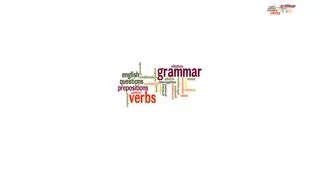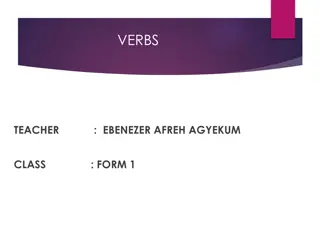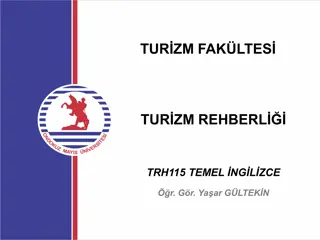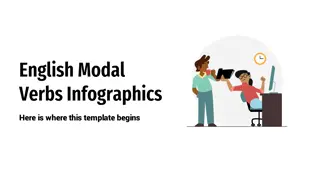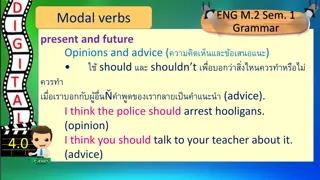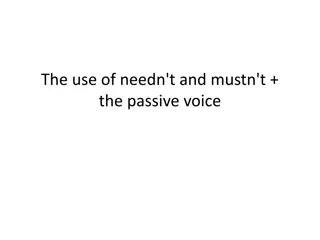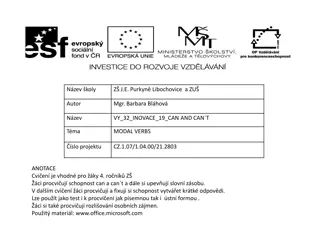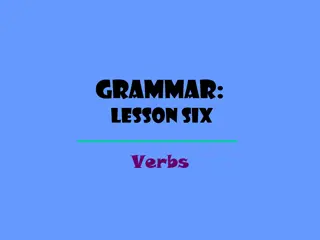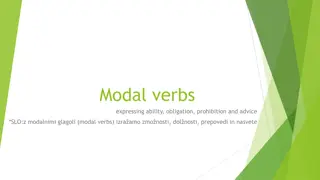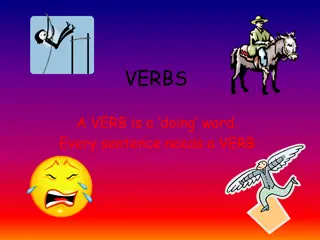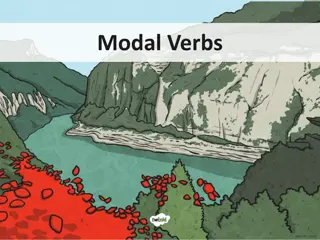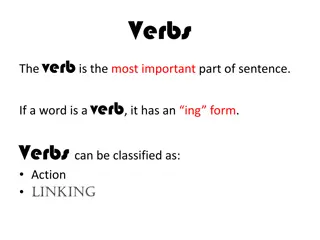Understanding Modal and Imperative Verbs: Usage and Examples
This content covers the explanation and examples of modal verbs, which express certainty, possibility, and obligation, as well as imperative verbs that denote commands and orders. Learn to identify and use these verb types accurately and creatively through practical examples and engaging activities.
Download Presentation

Please find below an Image/Link to download the presentation.
The content on the website is provided AS IS for your information and personal use only. It may not be sold, licensed, or shared on other websites without obtaining consent from the author. Download presentation by click this link. If you encounter any issues during the download, it is possible that the publisher has removed the file from their server.
E N D
Presentation Transcript
Modal and Imperative Verbs 1. What can you see picture? https://encrypted-tbn2.gstatic.com/images?q=tbn:ANd9GcR5rUmuEUBGLqz2wy0Cq48hae1oLWmzCAfpV479ewdOtogW7LtE in the 2. What happening? is 3. What are the moods emotions? and
Learning Objective: To identify and use modal and imperative verbs. WILF: I can write some sentences with modal and imperative verbs in. I can identify and use some modal and imperative verbs accurately. I can identify and use a variety of modal and imperative verbs accurately and consistently. I can identify and use a wide range of modal and imperative verbs creatively and accurately.
Title - Modal Verbs Modal Verbs We use modal verbs to show if we believe something is certain, probable or possible (or not). could might should may ought must would
Title - Modal Verbs Modal Verbs What is the difference between these two sentences? could might should may ought must would What is a modal verb? You must do your homework. Write 3 examples. You could do your homework. Write 3 sentences with different modals in.
Title - Imperative Verbs Imperative verbs are orders or commands. They tell you what to do! Can we think of some more examples?
Title - Imperative Verbs They tell you what to do. What is an imperative verb? They are doing words. Write 3 examples. Write 3 sentences with different imperatives in.
Look for these words in the paragraph 1: playing and must. Label all the modal and imperatives in paragraph 1. Label all the modals and imperatives in paragraph 1 and 2. Label all the modals and imperatives across the text.
All children, except one, grow up. Should children have to grow up or not?
All children, except one, grow up. I think children should not grow up. They could spend all their time playing on their Xboxes instead. They can grow up but they would have to work instead!
All children, except one, grow up. Should children have to grow up or not? Use these words in your answer: should, will, must, work, play, run. Use modals and imperatives. Use modals, imperatives, adverbial starts. Use modals, imperatives, adverbial starts and ambitious punctuation such as colons and semi colons.
Self Assess Using a red pen, underline and label your imperative verbs and modal verbs. Modal verb I think children should not grow up. They could spend all their time playing on their Xboxes instead. They can grow up but they would have to work instead! Imperative verb



